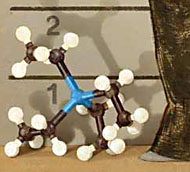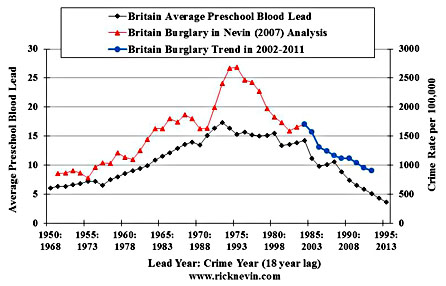 By the time you see this I should be on a plane to New York, where I’ll be on the Melissa Harris-Perry show tomorrow on MSNBC talking about lead and crime. (Plus a few other topics.) One of the other guests on the lead panel will be Howard Mielke of Tulane University, who’s been doing lead research in New Orleans for the past two decades. Sarah Zhang interviewed him as part of our lead package for this issue, and you can read her interview here.
By the time you see this I should be on a plane to New York, where I’ll be on the Melissa Harris-Perry show tomorrow on MSNBC talking about lead and crime. (Plus a few other topics.) One of the other guests on the lead panel will be Howard Mielke of Tulane University, who’s been doing lead research in New Orleans for the past two decades. Sarah Zhang interviewed him as part of our lead package for this issue, and you can read her interview here.
Before I head out to the airport, though, here’s another tidbit about lead and crime that didn’t make it into my magazine piece. (If you still haven’t read it, click here.) As you’ll recall, lead emissions mainly affect children. This means that when emissions decrease, you have to wait about 18 years to see any effect on violent crime. In the United States, lead emissions started to decline in the mid-70s, and crime began to decline in the early 90s. But what about the rest of the world?
Rick Nevin wrote an extensive paper in 2007 linking lead emissions to crime rates in other countries, so I asked him for his predictions about the decline of crime elsewhere in the world. Here’s his forecast:
- The USA violent crime rate is now down about 50% from its peak in 1991, and I expect that the violent crime rate in Western Europe will be down by about 50% from its peak over the next 20 years, with the largest part of that decline over the next ten years.
- Eastern Europe will follow the same trend, but will take a few years longer because they left gasoline lead levels quite high through the end of the Soviet era.
- Crime will also plummet over the next 10 to 20 years in Latin America, where leaded gasoline use and air lead levels fell
 sharply from around 1990 through the mid-1990s.
sharply from around 1990 through the mid-1990s.
The chart on the right shows just a single example of a non-U.S. link between lead and crime: the burglary rate in Britain. It peaked in the mid-90s and has been falling steadily ever since, following the same curve as blood lead levels in preschoolers. Nevin has a more layman-friendly version of his paper here if you want to dig into this further. He discusses lead levels and crime rates in Britain, Canada, Australia, West Germany, France, and New Zealand. His paper also discusses several things that I didn’t mention in my article, including the effect of living in a housing project near an expressway; recent arrest rates by age group; the disproportionate effect of lead emissions on African-Americans; Steven Levitt’s famous theory about a link between abortion and crime; and the impact of lead on IQ and school test scores. It’s worth a read.

















